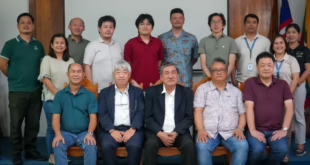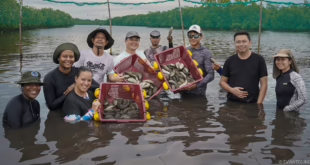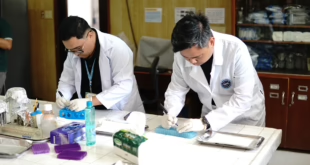By Development Communication Section

A total of 123 trainees (from the academe, local government units & private sectors) attended AQD’s 12 (regular & specialized) training courses from January 2014 up to the latest. The courses are mainly on aquaculture technologies (nursery, hatchery and grow-out) of various commodities, aquafeed formulation & preparation and fish & crustacean diseases. A course on information dissemination & data management was also organized for the Philippines’ Bureau of Fisheries and Aquatic Resources-National Fisheries Research & Development Institute (BFAR-NFRDI).
Trainees, coming from different parts of the world, come to training with great expectations and AQD always endeavors to meet and even exceed them. As one of the Kenyan trainees who attended the aquafeed formulation & preparation course, Mr. Agwata Ototo said, “I am very grateful for the experience that I have here; we wanted a training that will transform the academic knowledge that we have into practice and indeed we achieved it here”.
The training course on mud crab hatchery, nursery and grow-out operations garnered a good number of 23 participants this year including partners in the Department of Science and Technology’s national mud crab R&D program and private individuals. AQD Chief Dr. Felix Ayson said the number of participants reflects the popularity of mud crab aquaculture at present. The Chief also encouraged the trainees to go into soft-shell crab production because of its increasing demand in the market. The training taught the trainees to produce crablets by following proper broodstock management and hatchery procedures.
A 9-day course on information dissemination and data management was requested by NFRDI. The course primarily covered the skill set required of science writers like news writing, design & layout, photography, website & social network mechanics; and accessing published information found in library databases, among others. With AQD providing training mainly on aquaculture technologies, this is the first time that a non-technical course was offered. The course for NFRDI was not the first session though; the first was conducted for SEAFDEC information officers in December 2011.
AQD still has a handful of upcoming training for the second half of the year including courses on detection of viral diseases in marine fish & crustaceans (1-9 September), marine fish culture (4-30 August), seaweed farming (1-12 September), catfish culture (18-22 August), community-based freshwater aquaculture supported by GOJ (25 November-4 December) and a second session of mud crab hatchery, nursery & grow-out operations (14 October-5 November).


 SEAFDEC/AQD Southeast Asian Fisheries Development Center | Aquaculture Department
SEAFDEC/AQD Southeast Asian Fisheries Development Center | Aquaculture Department



